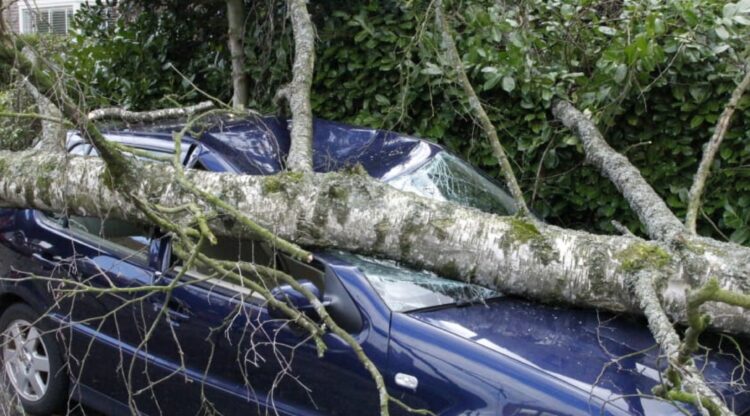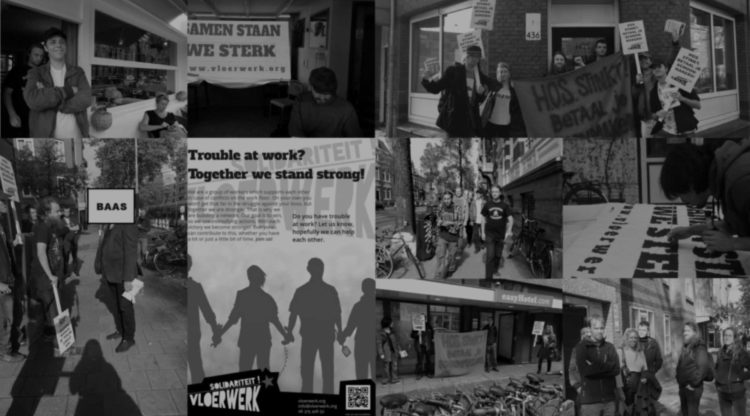
Service provider to glutton: CED's growth, worker policy and washouts. The Marisella case.
Almost nobody has heard of the company named CED, but almost everyone has dealt with it in one way or another. Vloerwerk has recently investigated CED because it fired a worker for political reasons. What we discovered surpassed our wildest expectations. Connections between CED and the earthquake damages in Groningen, the failure of covid-19 phone lines, and the case of this fired worker. Is CED a damage appraisal company? Or is it a gluttonous company that raises serious questions? This article is the first in what could become a series of publications on CED.
CED has not always been this insatiable holding company operating under 81 different names. It used to be a simple enterprise appraising damages. An employee that worked for the insurance company ‘’Europeesche Verzekeringen’’ during the 80’s recalls: ‘’if the damages were small, we could appraise them ourselves. When damages exceeded a certain estimate we’d call in someone from CED to appraise them’’. And this is wat CED did: appraising high value or complicated damages, and subsequently settling them. A group of Dutch insurance companies had established this Central Expertise Group in 1971. The company had a clear function and role. CED was a service provider to the Dutch insurance industry. It operated as a foundation with insurance companies as members.
CED: cobbler, stick to your last? The last crisis & aftermath 2008 – 2014.

The process of changing CED from as service provider to a gluttonous corporation went in many steps but the big changes happened during the most recent crisis in capitalism: the credit crunch also known as the euro-crisis or the big recession. We’ll skip some details to keep the story concise. CED had developed the urge to grow that now typifies the company even before the euro-crisis, and has evolved to include more tasks than just appraisal and settling damages during the decades of its existence.
A familiar abyss.
The financial world collapsed between 2008 and 2009 under the pressure of its collective madness and greed. Companies disappeared, split, merged or were nationalised. Looking back, it all appeared structured and normal but at the time it was utter chaos. CED was partially nationalised through a branch named ‘’Amersfoortse Stad Rotterdam’’. A debate erupted in the Netherlands: should those companies that were saved through many billions of public funding be given a public function? Something we all should have some control over? But the neo-liberal Rutte administration in The Hague wanted to return the situation to the way it was before the crisis: the salvaged companies were sold to the private market and stock exchange.
Meanwhile, CED is not holding back, but is growing aggressively. The concept of being a service provider had been wholly abandoned. Remarkable behaviour for a company that was just saved through public spending. CED’s new purposes are profit, growth and even more profit. In 2014 CED reports that its revenues are up 30% over a period of three years. CED invests a lot, including in automisation, which it outsources to Tunisia. The goals of this automisation are more efficiency, higher quality and more focus on the customer. Improvements everywhere! Everyone who knows something about digitialisation would have seriously doubts about these claims.
Growth itself is the target?
The Dutch state sells ‘Amersfoortse Stad Rotterdam’ in 2016. Insurances companies say ‘’thanks for all the billions’’ and push CED to its next form of existence: property of a private equity firm. Because CED had ‘’outgrown its original purpose’’ a process is started to sell it to Blackfin. This process is completed in 2018. This firm, whose only goal is to enrich those who are already rich, describes itself as such: “Blackfin Capital Partners is the leading private equity firm focusing on financial services across continental Europe”. Blackfin is a French corporation established in 2009. During and directly after the financial crisis, it raged through the European financial sector, its goals being growth, profit, more growth, more profit, becoming market-leader and gaining a monopoly. CED has an important part to play in this scheme. It is a match made in heaven, and a natural new home for CED.
Groninger earthquakedamages. Dramatic processing.
Providing services an afterthought, a [kostenpost]?
Everyone content? Far from it. CED employs people and it still provides services. Remarkably, the company that is mostly unknown to the general public boasts continuously in its publications about many of its wrongdoings. This very hungry caterpillar, this glutton, plays a central role in, and is responsible for, many infamous scandals in the Netherlands.
‘’CED never rejects an offer’’ according to Operational Manager van der Alphen, of ‘Centrum Veilig Wonen’. He was involved in settling the earthquake damages in Groningen from 2014 onwards, on behalf of CED. Initially he even worked for the infamous gas company ‘NAM’. The handling of the damage claims is an infamous disaster, extremely frugal, mistrustful and extremely slow. How well did CED actually perform? How competent is this organisation, focused solely on growth?
After being involved in the disastrous affairs in Groningen, CED was eager to claim yet another massive public job: tracing sources and contact of Covid-19 infections on behalf of the Dutch centre for disease control ‘GGD’. CED would play an important part in this task together with the Red Cross. ‘’The GGD centre for disease control chose to work with these organisations because they have the expertise needed for the task and they are able to provide expert personnel and train more. Another reason to pick these organisations is their ability to commit to a long-term handling of the tracing of sources and contacts.’’ At the time, tracing of sources and contacts of persons infected with Covid-19 was a key part of the strategy to contain the pandemic. It became an utter failure. The practice was virtually abandoned. What about CED’s ability to quickly provide expert personnel?
The two recent jobs of CED with great societal impact turn into drama’s.
Two huge jobs, both a disaster. CED bets high and, as a result, is now partially responsible for much suffering in the Netherlands. However, revenues are still increasing, so CED is content. They even show pride about their part in these projects. But what is there to be proud of? CED is far from diligent in their treatment of their expert personnel. This is also what Mariselle de Cuba experienced. She was an experienced and trusted worker, but she was forced to yield her position. Not because of poor performance, but because far-right activists pressured CED. This is an example of a pattern within CED, where good people leave to be replaced with inexperienced and pliable workers. Even when the gluttonous nature of CED emerges further and further, its personnel policies hamper its own capacity.
Human Resources policy at CED is a problem. Turn the tide: Marisella back.
The department where Marisella de Cuba was employed, Multiherstel BV, was acquired by CED in 2015. Multiherstel itself did not have a great record in how it treated employees, so initially the takeover by CED was an improvement. The workers at Multiherstel and CED worked towards a better atmosphere and overall situation.
Marisella:
I’d been at the point of handing in my key tag several times. Fortunately, they listened and the culture became more open in a way where not everything was cast in stone; workers became increasingly involved in changing the way we worked.
The wind unfortunately blew another way.
Near the end of 2018 the management left, we didn’t know why. We got a new manager. For a long while, everything went well: we did our job and the atmosphere in the workplace had been great. New colleagues were hired, and time was spent to train them. Unfortunately, the period where we trained new personnel well, was short. We often suffered personnel shortages, and the fact that wages were minimum-wages didn’t help. More and more poorly trained personnel was handling the phone-lines, the experienced workers came under increasing pressure and workload without being rewarded with higher wages. We didn’t get irregularity payments for evening shifts, night-shifts or working during the weekend.
Crescendo: forsaking faithfull workers because extreme right-wing freedomhaters tell you to.
What exactly happened in 2018? Why was the management replaced? It was because CED was taken over by the insatiable Blackfin. Blackfin amplified the aggressive growth of CED. There is a link between the ‘growth and profit above everything else -policy on the one hand, and the poor handling of personnel and the utter failures of CED’s public tasks on the other hand. The fact that CED fired Marisella de Cuba, a worker of good standing who protected the quality of CED’s service-levels, due to pressure of the far right ‘’Vizier op Links’’, fits in this dreary perfectly. As far as management was concerned, the fact the Marisella was being targeted by the far right was a threat to CED’s future growth.
No matter from what angle you approach it, CED plays an important part in Dutch society. Therefore, it is unacceptable that it cuts quality requirements on behalf of profit. Personnel policies in CED need to change. Apologizing to Marisella de Cuba and offering her a permanent contract would be a good starting point. Due to the nature of this case, there are more requirements: CED needs to acknowledge publicly that workers have the right to be politically engaged, without being fired. This is an inalienable right in the Netherlands.
Vloerwerk organises jointly with our new member Marisella for the foreseable future a campaign to stop this injustice.
The campaign setup will in a sence be a familiar process to those who follow us. The lockdown & curfew however force us to innovatie.
Vloerwerk is build for lang-lasting camaigns of direct action, modernisation is a core value.
Be it clear that CED is an unfamiliar opponent for Vloerwerk.
The importance of this struggle befits this.
However, as always: every company has it’s weak points and against those we place our strong points.
More then in other campaigns we’re working together with other organisations and friends. A callout: sign up your group or yourselves as a volunteer.
In this campaign each and everyone can play a part.
We contact you. Mail us or use the form below.
This piece is a sequel to:
Marisella, strijdbaarder dan ooit


